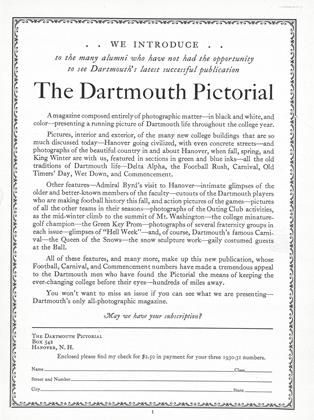By Crawford Morrison Bishop, Ph.D. '06. This useful and scholarly treatise is a doctoral dissertation submitted to the Faculty of Political Science at Columbia University in partial fulfilment of the requirements for the Ph.D. degree.
The subject is a timely one, for as the author points out, there has been a constant increase in the number of international arbitrations. Furthermore, between 1828 and 1927 a total of 296 treaties of arbitration were negotiated and are still in force. The United States has been a party to some of the most notable arbitration cases of the past century and American jurists and political leaders have made notable contributions to the cause of a better international order by supporting this method of settling disputes.
It is apparent, however, that a mere willingness to arbitrate a controverted question does not by any means assure a satisfactory settlement. Students of the subject will readily recall how frequently disagreements as to the filing of cases, countercases and arguments, publicity, the time to be allowed for further pollection of evidence, and similar matters have led to unsatisfactory results and protracted ill-will between the parties. Dr. Bishop has collected and presented in concise and understandable form the rules of procedure followed in many of the classic arbitration cases. His study of the procedural methods of international claims commissions is of special interest in view of the vast amount of business transacted by such bodies during the last decade. The analysis of procedure in the Permanent Court of International Justice will prove of particular interest both to the legal profession and the student of international affairs.
Dr. Bishop points out that since 1907 "the tendency has been to adopt more rigid rules and to observe those adopted more closely. Courts of arbitration are getting away from the old notion that because the litigant parties are sovereign states, the rules must be so modified or so interpreted as not to wound their susceptibilities. Just in the measure that the rules are strictly applied, as in ordinary actions in a court of law, will the influence and dignity of an arbitral tribunal be extended."
If the great goal of civilization is the reign of law among the nations every forward step is significant. Dr. Bishop quotes with approval President Coolidge's remarks before the Pan-American Conference on Arbitration and Conciliation two years ago, in the course of which he pointed out that the peaceful settlement of disputes would be greatly promoted "if we provide ourselves before the event with the necessary judicial machinery and promulgate rules of procedure to govern the composing of differences."
This dissertation shows a wide range of research and the student of international law will be enabled to reach a great body of information hitherto scattered in obscure or inaccessible records. The facts of international controversy and the results of arbitration proceedings are doubtless of greater general interest, but this study of procedure fills a noticeable gap in the literature of the subject.
 View Full Issue
View Full Issue
More From This Issue
-
 Article
ArticleThe Class of 1934
November 1930 By Charles R. Lingley -
 Class Notes
Class NotesCLASS OF 1930
November 1930 By Albert I. Dickerson -
 Lettter from the Editor
Lettter from the EditorEditorial Comment
November 1930 -
 Class Notes
Class NotesCLASS OF 1913
November 1930 By Warde Wilkins -
 Class Notes
Class NotesCLASS OF 1920
November 1930 By Allan M. Cate -
 Article
ArticleA Course in the Department of Biography
November 1930 By Harold E. B. Speight
Books
-
 Books
BooksTHE DIARY OF A RAPIST.
JUNE 1966 By CLIFF JORDAN '45 -
 Books
BooksJOURNEY OF A JOHNNY-COMELATELY.
November 1957 By HOWLAND H. SARGEANT '32 -
 Books
BooksTABARD
October 1951 By Kenneth A. Robinson -
 Books
BooksCOCTEAU, A BIOGRAPHY.
JANUARY 1971 By NEAL OXENHANDLER -
 Books
BooksHILL WIND
March 1936 By R. B. Chamberlin -
 Books
BooksFAINTING.
April 1951 By SVEN M. GUNDERSEN, M.D.


